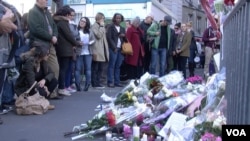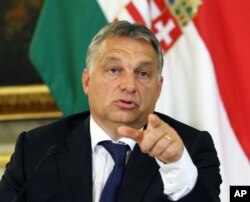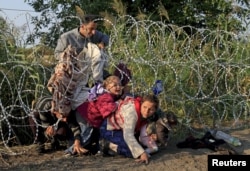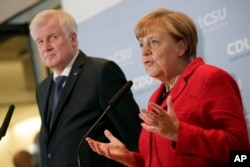If the year that was turned out to be daunting, 2016 is shaping up as the European Union's year of living dangerously.
The cliffhanger to keep Greece from bankruptcy and in the euro currency during high summer was chilling enough, even before nations like Hungary ramped up their rhetoric over the influx of migrants and razor wire border fences were spun out over hundreds of miles, further highlighting the increasing weakness of the EU to speak with one voice.
Still, 2015 mainly involved minor countries with limited economic and political clout punching — and shouting — well above their weight.
The year 2016, however, will center on a juggernaut like Britain and an increasingly assertive Poland, both of which could become much more than a thorn in the EU's side. An economic recovery that keeps stalling on cooling relations with Moscow doesn't help. And none of that takes into account the looming possibility of another terror attack that could further damage the soul of the continent.
"The past year was full of unexpected plots and turns and the new year will be no different,'' said Professor Hendrik Vos of Ghent University.
Where even to start? Well, British Prime Minister David Cameron made that easy by setting a February summit of government leaders to find a deal on how to revamp the EU so that Britain could remain a member, and a more committed one at that.
"Uncertainty about the future of the UK in the European Union is a destabilizing factor,'' said EU Council President Donald Tusk ahead of the year-end EU summit. Many differences remain within the realm of compromise but British insistence to make it harder for EU citizens living and working in Britain to get social and welfare benefits remains a fundamental dispute in a bloc that strives for equality among all.
Talk is that a referendum on whether to stay in the EU could come as soon as next summer, well ahead of the end-of-2017 deadline, and the result could become the EU's defining moment of the year.
"I certainly don't exclude that the British will decide to leave the EU,'' said Vos. And, some high up in the meeting rooms of the EU institutions, fear that could be the tipping point that starts the bloc unraveling for good.
The EU has been on a slide after the major expansion into eastern Europe in 2004 with treaty rejections, financial crises and internal dissent. And after helping new eastern members raise living standards and confidence, it is now getting a backlash of criticism from nations like Hungary, the Czech Republic, Slovakia and Poland.
EU relations with Poland have taken a dip since a new conservative and nationalist government took office in November and started stressing Polish interests at the cost of the common EU good. As a symbol, Prime Minister Beata Szydlo removed EU flags as a backdrop to weekly government news conferences, saying they will be held only against the backdrop of the "most beautiful white-and-red'' Polish flags.
The European Commission, for its part, has started criticizing Poland much like it has Hungary under Prime Minister Viktor Orban, who has consolidated power by weakening the judiciary, the media and other institutions.
Germany's EU commissioner, Guenther Oettinger, told Wednesday's edition of the Bild daily that an increase in populist governments within the EU worries him. "For the first time, I see a serious danger that the EU could disintegrate.''
When it comes to the refugee crisis, unity was even harder to come by with many eastern nations flat-out refusing to take in a share of refugees who have flocked to wealthy heartland nations like Germany. The 2015 figure of people fleeing conflict or poverty who have arrived in the European Union by sea this year hit the one-million mark and after the traditional winter lull, the challenge will be to keep the number much lower next year.
The role of German Chancellor Angela Merkel will be key again. She will try to galvanize the EU into a united response and to get others to share the refugee burden that already created massive political pressure at home to stem the influx.
Merkel still hopes other EU nations will get the message and things will click into place. "We must now learn how to deal with a completely new phenomenon,'' she said. "And I trust that, with goodwill, this will then happen slowly and step by step,'' she said.
And it's unlikely the economy will be of much help in shoring things up.
Even if Europe enjoys a modest economic recovery in 2016, it will only be with the help of very low oil prices and massive monetary stimulus by the European Central Bank. The European Union's executive commission in Brussels forecasts growth of 1.8 percent in 2016. Unemployment should fall modestly to 10.6 percent from 11.0 percent this year, but massive disparities between nations like Germany with low jobless rates and Greece and Spain with painfully high ones are expected to persist.
After a year in which its woes almost pushed it out of the shared euro currency, Greece faces more economic and political struggles in 2016. The government must push through painful reforms to keep getting additional payouts from its 86 billion euro bailout agreed to at a crucial summit in July. With only a three-seat majority in parliament, left-wing Prime Minister Alexis Tsipras faces a struggle to pass potentially unpopular legislation raising taxes on farmers and putting the pension system on a more sustainable basis through benefit cuts or contribution increases.
The bigger question is whether the country's latest bailout has any chance to right the government's finances without forgiveness of part of Greece's debt burden, the biggest in the eurozone at, according to Greek predictions, 187.8 percent in 2016. Some economists say that amount of debt is too big to be brought down to more tolerable levels.
Adding to the unpredictability of the year, Spain, the EU's fifth biggest economy, entered the new year with a political stalemate following inconclusive elections and was heading for uncertainty that could affect the EU too.
In a sense though the EU has dealt with a relentless crisis atmosphere for much of the past decade, and by now knows about every trick of the political trade to survive.
"Look at it from a distance, and the EU is always tougher, hangs together tighter, than people think,'' Professor Vos said.








